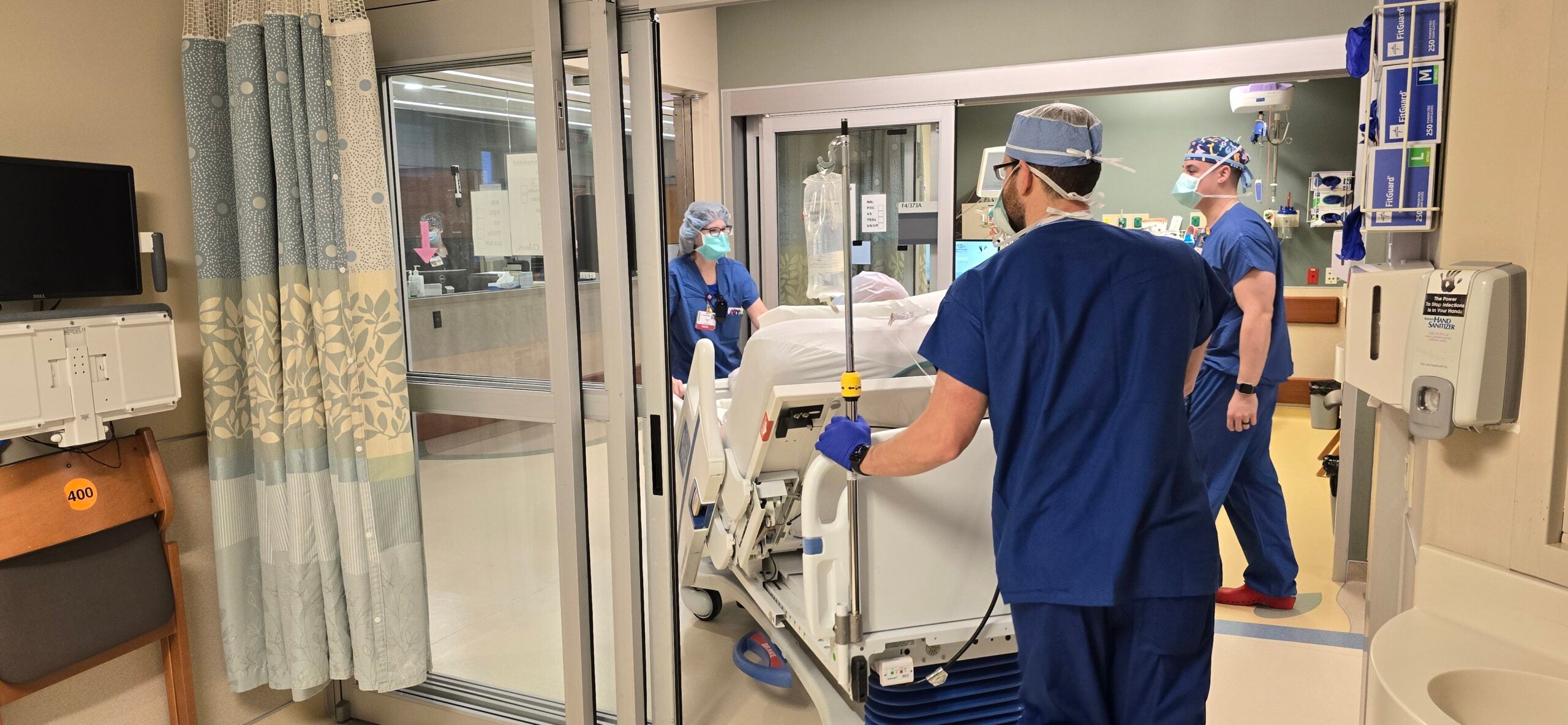This story was published in partnership Wisconsin Watch.
Dale Huhnke searched the web last spring for someone at Cedarhurst Senior Living who he hadn’t already begged for answers. He had a simple question: Could his 88-year-old mom stay in the Verona, Wisconsin, assisted living community once Medicaid began paying her bill?
Then he clicked on the Washington Post’s report that Cedarhurst’s Madison facility had recently ousted its Medicaid residents.
News with a little more humanity
WPR’s “Wisconsin Today” newsletter keeps you connected to the state you love without feeling overwhelmed. No paywall. No agenda. No corporate filter.
“That’s when everything just suddenly became very clear,” Huhnke said.
After two years of paying out of pocket, his mother — who asked that Wisconsin Watch not use her name due to privacy concerns — was poised to exhaust her life savings within 10 months. That would leave Medicaid, the joint state and federal aid program, as her only payment option.
Cedarhurst would likely serve the woman with a 30-day relocation notice ahead of that transition, state experts in long-term care told Huhnke. With no funds to continue private pay, her options near family would shrink or disappear.
Huhnke vowed to move her before any of that happened.
“I was just consumed with it. I did nothing else for three days,” he said. “Because at that point, I was like, ‘I’ve got to get her out of there.’”
Some seniors choose assisted living while seeking more independence and a less institutionalized setting than traditional nursing homes. But Huhnke’s housing scramble illustrates a potential downside: fewer protections for residents transitioning to Medicaid.
Federal law bans nursing homes from ousting residents due to a Medicaid transition — if the facility accepted Medicaid when they moved in. That’s not the case for assisted living facilities.
Wisconsinites may increasingly face such challenges as the state’s population skews older. The issue also affects younger adults with disabilities enrolled in assisted living facilities.
More independence, fewer housing protections
Over the last two decades, Wisconsin expanded Medicaid coverage beyond nursing homes. Today, elderly people or adults with disabilities can access alternatives, like assisted living, unless they need medical services only nursing homes can provide.
Over 90 percent of Wisconsin Medicaid recipients received long-term care outside of institutional settings, like nursing homes, according to an analysis of 2020 data by KFF, a health policy research firm.
The state and federal governments save money when Medicaid-eligible seniors choose assisted living instead of a nursing home. But that choice comes with vulnerability.
At least four Wisconsin assisted living facilities relocated residents who required Medicaid assistance between 2022 and 2023, according to reporting from WPR and the Washington Post.
Once relocated, seniors struggle to find alternatives. Many Medicaid-accepting facilities require private pay for years before they consider accepting government payments.
The state health department and Legislature are pursuing piecemeal changes to alleviate barriers to care. They include using temporary funds to raise Medicaid reimbursement rates to facilities. But experts say broader changes are needed to protect access.

Medicaid reliance limits options
Huhnke’s journey to find housing for his mom started in 2021, when his dad needed memory care, specialized housing for people with Alzheimer’s or dementia. Instead of staying in their apartment alone, Huhnke’s mom wanted to live in the assisted living wing of her husband’s facility.
They had plenty of options.
Huhnke’s dad typically worked two to three jobs his whole career, with his mom doing part-time work. Their savings covered the cost of around two years of care. A year of assisted living in Wisconsin costs more than $60,000 on average, according to estimates by Senior Living.
Huhnke checked each facility’s food offerings and social calendars and observed how comfortable residents seemed outside of their rooms.
The family picked Willow Pointe, which Cedarhurst bought in 2021.
“It was just wonderful,” he said. “The food was wonderful.”
Huhnke knew his parents would eventually rely on Medicaid.
Willow Pointe officials assured Huhnke they would later accept Medicaid payments as long as they first paid privately. Even during the facility’s sale, they told Huhnke in writing that Cedarhurst would later take Medicaid.
It initially did. Huhnke’s father transitioned to Medicaid before dying in August 2022.
But as Huhnke’s mom neared Medicaid eligibility months later, he discovered she needed to leave.
Cedarhurst in Verona did not respond to Wisconsin Watch’s requests for comment, but a spokesperson told the Washington Post in 2023 that the company stopped accepting Medicaid at its Madison facility because beneficiaries required more medical care than staff could provide.
The Aging and Disability Resource Center (ADRC) of Dane County identified just three communities for Huhnke and his mom to tour ahead of a Cedarhurst ouster.
In Dane County, at least 119 apartment and larger community-based assisted living facilities accept state-funded payments, but nearly 60 percent require at least some amount of private pay first, the ADRC found in its latest survey.
Medicaid payments lag behind care costs
Wisconsin is not the only state where facilities that accept Medicaid require initial private pay.
The reason? Simple economics.
Medicaid reimbursements lag far behind the cost of care. Requiring initial private pay helps facilities know how many Medicaid recipients they can afford to accept, said Mike Pochowski, president and CEO of the Wisconsin Assisted Living Association.
Assisted living facilities on average pay caregivers between $17 and $20 an hour. State reimbursements assume caregivers make just $13 an hour, Pochowski said, adding that low rates have forced some facilities to close.
Some critics argue that accepting Medicaid only after out-of-pocket pay violates federal law.
“If you’re taking Medicaid, you have to take Medicaid. You can’t put the screws to people who are eligible for Medicaid,” said Eric Carlson, director of long-term services and support advocacy with the legal nonprofit Justice in Aging. “And that’s not conditional on people paying you thousands of dollars ahead of time.”
Sometimes verbal agreements are broken once the Medicaid transition begins. That can happen when a staff member makes promises without authority or leaves for a new job, said Kim Marheine, Wisconsin’s state long-term care ombudsman.
Even some written promises don’t prevent relocations, such as when a facility is sold or cancels its Medicaid contract, Marheine said.
“My question to legislators is,” Huhnke said, “How is this legal?”
In nursing homes, it isn’t.
Federal law prevents nursing homes from removing residents due to a Medicaid transition. Even nursing homes that cancel Medicaid contracts must accept reimbursements for residents enrolled before the change.
The lack of similar protections at assisted living homes “needs a policy fix,” Carlson said.

Assisted living relocation was disruptive
Rosalie Hurley, who died on Feb. 27 at age 88, relied on Medicaid after draining her savings to pay for memory care at Emerald Bay Retirement Community in Hobart, Wisconsin.
Her relocation notice arrived last year as the facility ended its Medicaid contract.
Hurley’s daughter, Helen Johnson, halted her vacation in Florida when she heard the news. She called at least 15 assisted living facilities in search of a backup. Most turned her away because of private-pay requirements, Johnson recalled.
“It’s just a stressful situation all the way around,” Johnson said, “wondering if you are making the right decision and how she’s going to do when we get her there.”
The sudden need to move upset and confused Hurley, who had dementia, Johnson said. She assumed she was returning to her old house.
Emerald Bay did not respond to a request to comment for this story. But it previously cited increasing labor costs and inflation in explaining its Medicaid cancellation.
Wisconsin officials explore potential solutions
The state Department of Health Services wants to use federal pandemic funds to increase Medicaid reimbursements, bringing rates closer to the cost of care.
The plan, which requires legislative approval, would also give the state more control over how much money flows to assisted living providers.
The state doesn’t reimburse providers directly. It pays managed care organizations, which negotiate rates with providers, aiming to limit costs. Wisconsin’s four MCOs later pay providers.
The state currently lacks a say over how much MCOs pay providers for assisted living. The health department proposal would send MCOs more money for negotiations with providers and set a minimum reimbursement rate — as has been done for nursing homes.
States must finish spending all pandemic funds by the end of 2026. That means Wisconsin would need to find other funds for future minimum reimbursements. That cost will grow as the population further ages, said Rene Eastman, vice president of financial and regulatory services at LeadingAge Wisconsin.
Advocates say the minimum fees won’t fully alleviate barriers to care, but they should make it more affordable for providers to serve Medicaid recipients.
The state health department has yet to file its request for approval to the Republican-controlled Joint Finance Committee, according to the Legislature’s website.
The department expects to implement the proposal by July, a spokesperson told Wisconsin Watch and WPR.
The health department in 2022 used pandemic funds to boost reimbursement rates by 5 percent. That increase runs out in March.
Separately, proposed legislation would require community-based assisted living facilities with five or more residents to give more notice before a Medicaid-related relocation — extending the timeline from 30 to 60 days.
“It’s pretty downright cruel. So hopefully, we can at least get this done,” said state Sen. Robert Cowles, R-Green Bay, who introduced the bill following the forced transfers of some of his constituents.
The Senate passed the bill in January. The Assembly didn’t take it up before adjourning last week for the rest of the session.
Assisted living residents have some state protections when providers stop accepting Medicaid. Facilities with five or more residents who live in a community setting must help arrange care elsewhere before discharging residents, even if it takes longer than 30 days.
Those protections don’t apply to seniors in smaller, home-based care settings or apartment-style assisted living facilities. They also don’t apply to relocations of less than five residents or 5 percent of a facility’s population.
Assisted living facilities face caregiver shortage
Meanwhile, Wisconsin is addressing a caregiver shortage that’s pushing up assisted living costs.
That included expanding the WisCaregiver initiative in 2022, which connects people with certified nursing jobs and incentives for pursuing careers in the field.
“There’s no real magic bullet in terms of this will fix the caregiver crisis. It’s all incremental steps,” Pochowski said.
Have other states found broad solutions to housing challenges for Medicaid recipients? That’s unclear. Medicaid policies vary between states, and a lack of quality data hinders efforts to analyze different approaches, said Alice Burns, associate director of KFF’s Program on Medicaid and the Uninsured.
Facing limited options, Huhnke got lucky in searching for housing for his mom. They found a facility just three days after discovering she needed to leave the old one.
In February she transitioned to Medicaid.
“Our prayers were answered, and we found a great community and worked out a deal with limited funding,” Huhnke said.
Editor’s note: This story was updated to note that Rosalie Hurley died shortly before publication.
The nonprofit Wisconsin Watch (www.WisconsinWatch.org) collaborates with WPR, PBS Wisconsin, other news media and the University of Wisconsin-Madison School of Journalism and Mass Communication. All works created, published, posted or disseminated by Wisconsin Watch do not necessarily reflect the views or opinions of UW-Madison or any of its affiliates.






